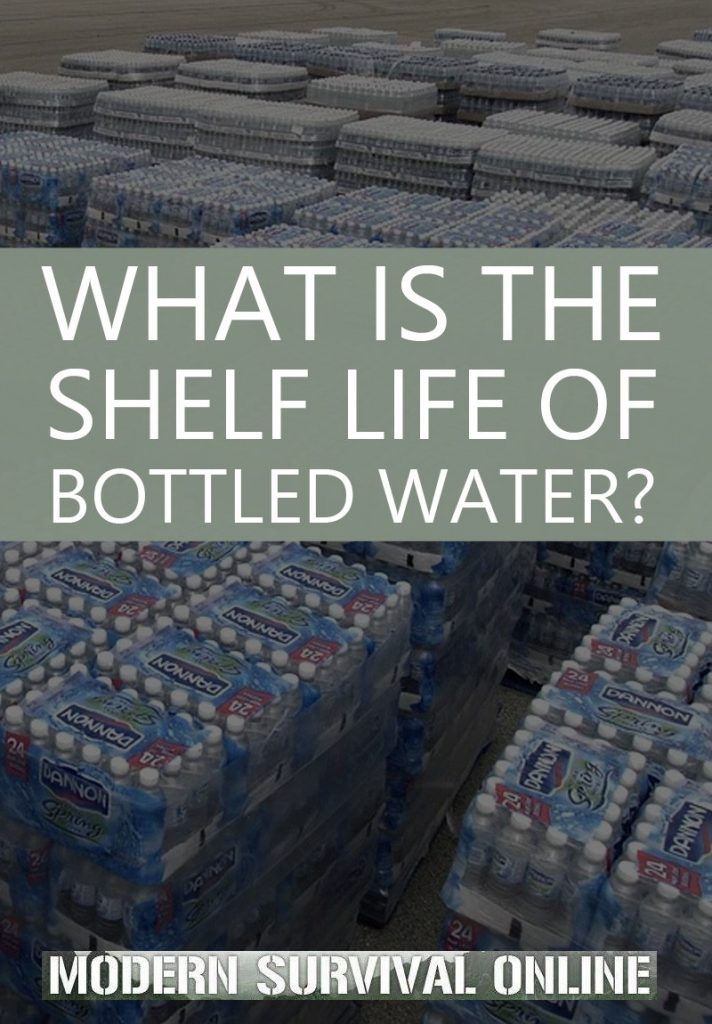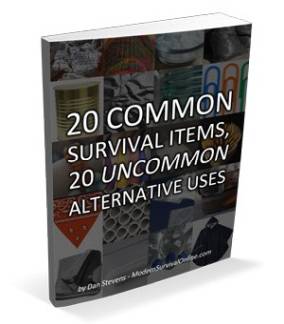Water is an absolutely essential survival provision, typically to be used for both drinking and cooking, since you cannot go more than just a few days without it before dying of dehydration, and you will be in bad shape significantly before then.
While some may rely on large storage barrels or tanks, most of us buy water by the bottle or the jug and stack it deep on shelves and in pantries. Most of us are meticulous about our food shelf life but never spare a moment to consider if our water expires.
Perhaps you haven’t either. But now that I have mentioned it, you probably question whether it will or not. Does it?!
Bottled water that is factory sealed does not really expire, even if it loses volume to evaporation over time. What is commonly called the expiration date on bottled water is really a “best if consumed by” date. You may though notice bottled water that is sealed will over time develop an unpleasant taste as chemicals leach from its container into the water. Also any sealed bottle or jug of water that has it seal broken or otherwise compromised may be contaminated by microbes or algae.
We will dig a little deeper into this occasionally confusing issue below.
It Sure Looks Like an Expiration Date…
It is understandable that you and other consumers might think that, and in certain locales it may actually be an expiration date as required by law. But that is all! That does not mean that the water really expires as do other perishable foods and drinks.
Because of this, manufacturers who sell their product at a regional or national level will probably look to keep costs to a minimum by standardizing any and all packaging in any way that they can.
This means that if any bottles must be embossed, engraved, inked or otherwise marked with this expiration or best-by date, then all bottles will likely be even if they are not heading for a market in a state that requires such dating.
While the savings per unit of making their bottled water this way is likely only fractions of a cent, when you look at the economy of scale over many tens of thousands or hundreds of thousands of bottles of water, that adds up.
Nonetheless, any printed date on a bottle of water is only a recommendation, and one that might not even have a basis in reality. Your water might taste just fine way beyond that prescribed date or it might start to taste off well before it.
The only way to know for sure is to conduct experiments using your chosen brand under the actual storage conditions you keep it in.
Is There Any Way to Tell My Bottled Water Is Bad?
Unfortunately, not really, not without opening it and tasting or testing it.
Even though your bottled water is good practically forever, with “good” in this case meaning “safe to drink”, it is not immune to evaporation and certainly not immune to a change in taste over time due to the leaching of chemical compounds from its container into the water itself.
This does not necessarily make the water unsafe to drink; not by any stretch, as the compounds may not be present in the water in any quantity that causes harm.
Before you listen to the prattling of the crunchy granola, Birkenstock-wearing types who would tell you that chemicals X, Y, or Z are going to make all your hair fall out, or make you go blind…
…remind yourself that the clearest and freshest tasting water taken from the remotest natural source could be contaminated with all-natural pathogens that could pose a far greater health risk.
The reason why your water develops this nasty taste over time is because water is a powerful, if slow-acting, solvent. Given enough time, it will start to dissolve and degrade almost anything on Earth.
Assuming that the bottle was not already contaminated when the water was poured into it at the factory, the compounds that make it taste funny (oftentimes described as a slightly burnt or metallic taste) simply come from the plastic packaging itself.
These same compounds are actually present in the water from the very moment it enters the bottle.
Modern scientists at major universities have assured us time and time again that these chemicals are not harmful in any amount that is typically to be expected in a bottle of commercial water, even if the water has been sitting for a long time.
Effects of Broken or Suspect Seals
All of the above information is only good and applicable if you are dealing with water that is factory sealed with a high degree of quality control.
If you are dealing with bottled water that was not sealed or has a compromised seal, or even worse someone has been drinking from it prior to being put away, you can count on the eventual blooming of bacteria and other microorganisms in that water.
As a general rule, if you open a sealed bottle of water you will want to use it within two weeks at the most, else the risk of microorganisms multiplying dangerously becomes too high.
Bottled water that has its seal broken and has been contaminated before being put away can see microorganisms start reproducing extremely quickly if the conditions are just right for their life cycles.
Everything from bacteria to viruses, parasites to prions can make you terribly ill or even be fatal in rare circumstances. If you are ever in doubt about water’s quality or safety make sure you run it through a filter or boil it before consuming it.
One quick note about algae… Algae multiply fast and furious when exposed to sunlight, and will coat the surface of water as well as the inside of the container holding it in a way that is liable to turn your stomach just from looking at it.
But, perhaps surprisingly, most species are harmless, and can even be eaten right along with your drink of water with no ill effects! You can, of course, always filter water that has a colony of algae in it to improve its flavor and appearance.
Conclusion
You don’t have to worry about your bottled water expiring, though if you leave it sitting for a very long time it might start to pick up a bad taste from its container in addition to losing some of its volume to evaporation.
This nasty taste has been judged by scientists to be non-harmful, as it only affects the palatability of your water.
Any bottled water that you purchase that has its seals broken or otherwise compromised will likely eventually become contaminated by microorganisms and made unsafe to drink.
It is still best to treat any suspect container or bottle of water if you fear its seals have been broken. Aside from that, you can completely ignore the expiration date printed for embossed on your bottle of water when storing long-term.


Like what you read?
Then you're gonna love my free PDF, 20 common survival items, 20 uncommon survival uses for each. That's 400 total uses for these dirt-cheap little items!
We will not spam you.
What about storing tap water in plastic bottles that previously contained soda? I should think that if the bottle, threads, and cap are thoroughly rinsed in bleach solution, filled with tap water (treated with chlorine by the public water company), and tightly sealed, the water should last as long as commercially-bottled water.
In my opinion tap water with the chlorine or ammonia in it for purification, has a bad taste if kept standing too long. For some reason bottled or in a glass I just don’t drink it….. tastes awful to me. To curtail some of the bad taste I keep it refrigerated. Better yet I filter it…AND refrigerate it. But for some reason probably having to do with the treating bottled water even warm doesn’t taste too bad. One article I read said to keep the bottled water for long periods of time avoid storing it in sunlight and in warm environment to keep the chemicals from the bottle leaching into the water.
Mikey W – I have been experimenting for the last couple of years with refilling empty commercial 3-liter spring water bottles with city tap water, closing the screw caps, writing the fill date on the cap, and finally storing the bottles it in a cool, dark spot. I’ve noticed a couple of things: (1) water bottled during the winter months seems to store longer (presumably the colder water holds more chlorine?) and (2) After 12 – 15 months, the water is still “water white”, but I start to see things suspended in the water when held up to light. I haven’t been brave enough to try it, but assume that if this water was filtered, treated, and or boiled that it would be perfectly fine. I rotate the bottles based on their fill dates, dumping the oldest and anything that’s questionable.
Sounds good to me. You’ve answered a lot of concerns that I’ve had about storage time and faulty bottle seals. Thanks so much to everyone who put their 2 cents into TV his discussion. Bill C.